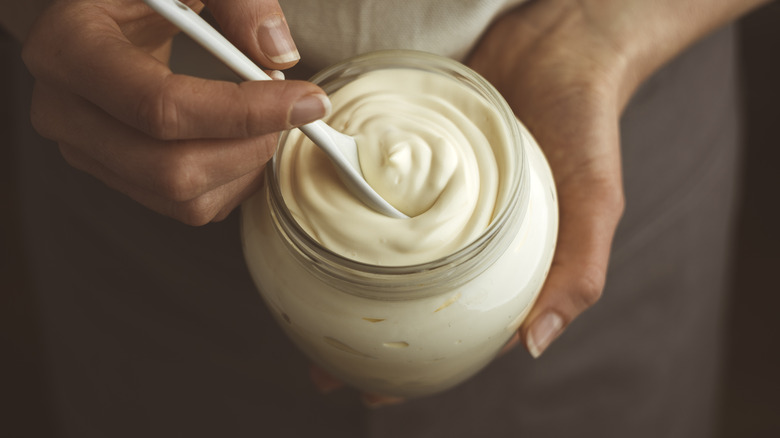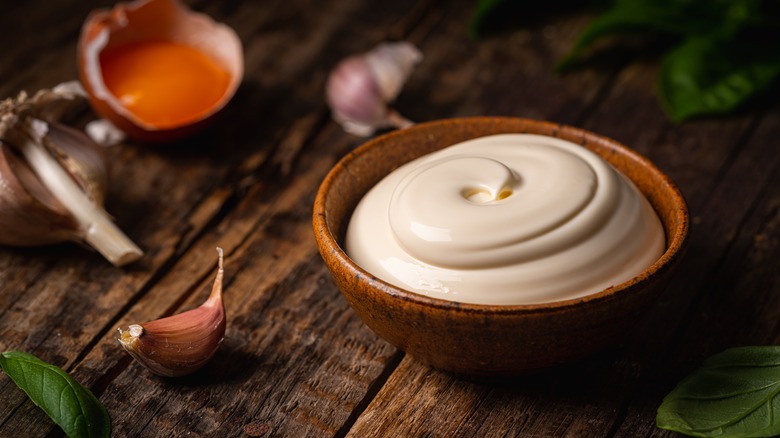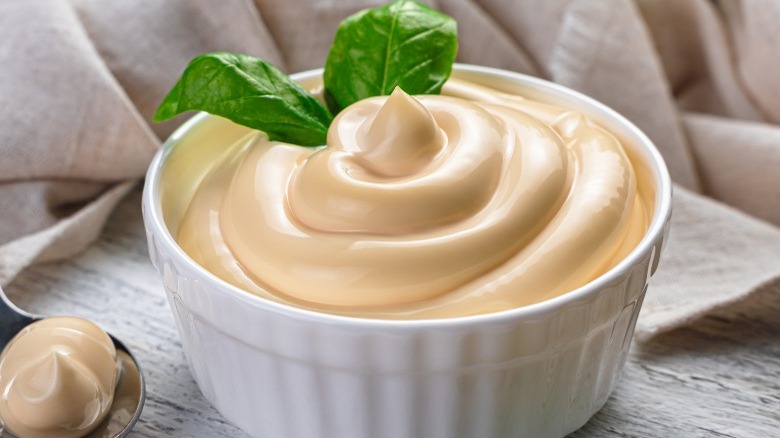Can You Freeze Mayonnaise?
There's nothing quite like mayo. It's the perfect companion to tuna, deviled ham, chicken, and egg salad sandwiches. It lends that luscious creaminess to cold picnic salads like potato and macaroni, and it's delicious when whipped into herbaceous aiolis and popular salad dressings like Caesar and ranch. Even better is slathering it on chicken and fish before baking, keeping them moist and juicy. Positively silken, mayonnaise adds a lovely subtle lemon zing when used as a dipping sauce for everything from fries to artichokes and asparagus, amplifying these veggies' already tasty profiles. And while the stuff that comes straight out of a jar from your grocer's shelves is convenient and delectable, nothing beats the freshness and mouthfeel of your own homemade mayonnaise.
The only problem is, because it's made with eggs, it has a short shelf life. Which means you may be left wondering how best to preserve this already finicky food friend. When most people think of preserving their food for longer, the first solution that comes to mind is freezing.
The question you should ask: Should you freeze mayo?
The answer to whether or not you can freeze mayo depends upon you and your tastes. Technically, the answer is yes, when it comes to freezing mayonnaise. But there are a few trade-offs you'll be making. So then the question becomes not can you but rather should you freeze your mayo? And how?
As Palak Patel, a chef at the Institute of Culinary Education, told Martha Stewart, it's a question of consistency, as food made with mayo can become "soft" and "rubbery" if it's frozen. While your mayo may look perfectly preserved while it's still frozen, Real Simple notes that the trouble starts once you thaw mayonnaise because it's an emulsion. And a broken emulsion means you'll likely have a clumpy, mealy, or goopy texture that just doesn't look very appetizing or spread well on bread. That's why, if you want to try freezing your mayo, you'll need to learn the most efficient way to freeze, thaw, and re-emulsify your mayonnaise for best results.
How to freeze, thaw, and re-emulsify your mayo
Can You Freeze This? recommends sterilizing freezer-safe glass jars and submerging them in a pot of boiling water for five minutes before filling cooled jars with mayonnaise. Make sure to leave about one inch of space from the top to allow for expansion during freezing.
As for defrosting, the site advises moving it down to the lowest shelf in your fridge to keep things food safe while thawing. Once your mayo has defrosted though, you may find it's lost that silken texture and liquid — including oil, lemon, or vinegar — may be sitting separated on the top of your precious mayonnaise. This reaction may be more pronounced in homemade mayonnaise, which does not have the benefit of commercial mayo's stabilizers. Can You Freeze This? offers that, depending on your situation, you can either pour off the separated liquid and try using it as is or attempt re-emulsification.
Re-emulsifying your mayo could be as easy as whipping it back together with your electric mixer or hand blender set on high for several seconds, but if that doesn't work, you may have to add a small amount of water, a bit at a time, until it all comes back together. Just be warned that this can result in a thinner sauce-like result.
Can't get your mayo to re-emulsify? Southern Living advises that you should used homemade mayo that you've thawed in dishes like casseroles and salads, so that its different texture doesn't make much difference to the food.
How long is frozen mayo good for?
It's important to note that freezing your mayonnaise won't buy you a whole lot more time. While commercial mayonnaise lasts much longer (three months when unopened and stored at room temperature and two months after opening and stored in the fridge, via Taste of Home), homemade mayonnaise goes bad much sooner. MasterClass says homemade mayo is only good for three days from creation when stored in the fridge. While freezing commercial jarred mayonnaise will get you an additional month or two, you buy yourself mere days when freezing homemade mayo — five to six days instead of three, according to Foods Guy.
Not only that, but homemade mayonnaise breaks down easier in the freezer since it lacks the stabilizers store-bought mayo contains. If you want to get the most out of your homemade mayonnaise, Paula at Salad in a Jar recommends making Lacto-fermented mayonnaise (or fermented mayonnaise) by whisking in some yogurt whey to your freshly made mayo to extend its life up to a full month: "Leave finished mayonnaise at room temperature for 8 hours to activate the enzymes found in yogurt whey and extend the shelf-life of your mayonnaise."



